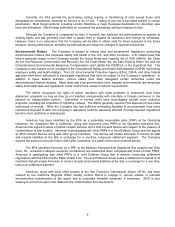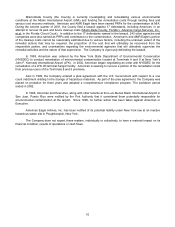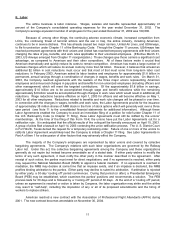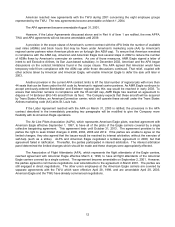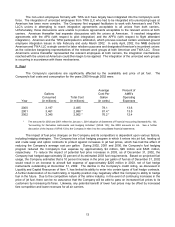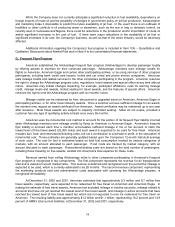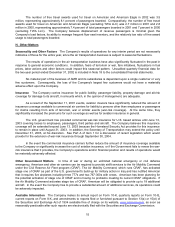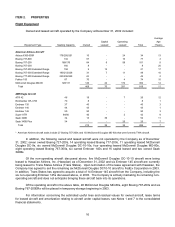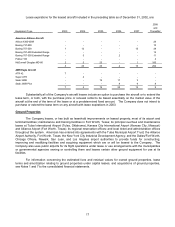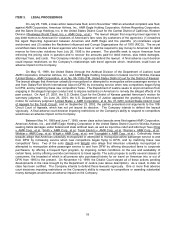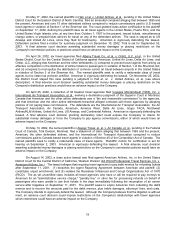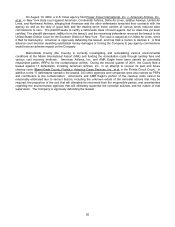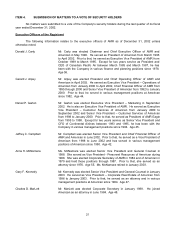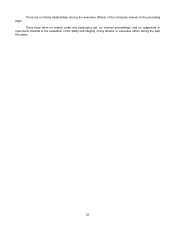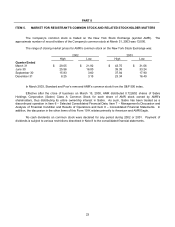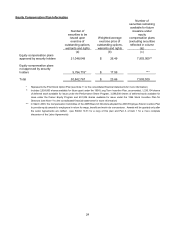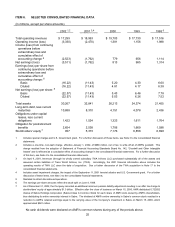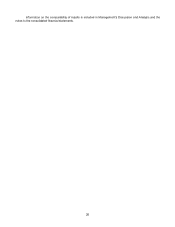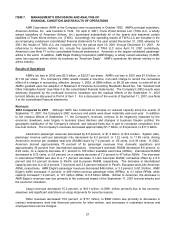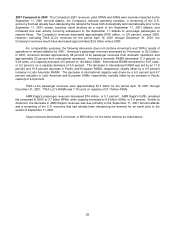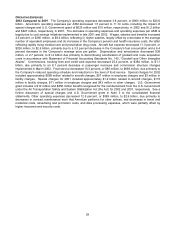American Airlines 2002 Annual Report Download - page 21
Download and view the complete annual report
Please find page 21 of the 2002 American Airlines annual report below. You can navigate through the pages in the report by either clicking on the pages listed below, or by using the keyword search tool below to find specific information within the annual report.
19
On May 17, 2002, the named plaintiffs in Hall, et al. v. United Airlines, et al., pending in the United States
District Court for the Eastern District of North Carolina, filed an amended complaint alleging that between 1995 and
the present, American and over 15 other defendant airlines conspired to reduce commissions paid to U.S.-based
travel agents in violation of Section 1 of the Sherman Act. The court granted class action certification to the plaintiff
on September 17, 2002, defining the plaintiff class as all travel agents in the United States, Puerto Rico, and the
United States Virgin Islands, who, at any time from October 1, 1997 to the present, issued tickets, miscellaneous
change orders, or prepaid ticket advices for travel on any of the defendant airlines. The case is stayed as to US
Airways and United Air Lines, since they filed for bankruptcy. American is vigorously defending the lawsuit.
Defendant carriers filed a motion for summary judgment on December 10, 2002. Trial is set for September 02,
2003. A final adverse court decision awarding substantial money damages or placing restrictions on the
Company’s commission policies or practices would have an adverse impact on the Company.
On April 26, 2002, six travel agencies filed Albany Travel Co., et al. v. Orbitz, LLC, et al., in the United
States District Court for the Central District of California against American, United Air Lines, Delta Air Lines, and
Orbitz, LLC, alleging that American and the other defendants: (i) conspired to prevent travel agents from acting as
effective competitors in the distribution of airline tickets to passengers in violation of Section 1 of the Sherman Act;
and (ii) conspired to monopolize the distribution of common carrier air travel between airports in the United States
in violation of Section 2 of the Sherman Act. The named plaintiffs seek to certify a nationwide class of travel
agents, but no class has yet been certified. American is vigorously defending the lawsuit. On November 25, 2002,
the District Court stayed this case pending a judgment in Hall et. al. v. United Airlines, et. al. (see above
description). A final adverse court decision awarding substantial money damages or placing restrictions on the
Company’s distribution practices would have an adverse impact on the Company.
On April 25, 2002, a collection of 38 Quebec travel agencies filed Voyages Montambault (1989), Inc. v.
International Air Transport Association, et al., seeking a declaratory judgment of the Superior Court in Montreal,
Canada that American and the other airline defendants owe a “fair and reasonable commission” to the agencies,
and that American and the other airline defendants breached alleged contracts with these agencies by adopting
policies of not paying base commissions. The defendants are the International Air Transport Association, the Air
Transport Association, Air Canada, American, America West, Delta Air Lines, Grupo TACA, Northwest
Airlines/KLM Airlines, United Air Lines, US Airways, and Continental Airlines. American is vigorously defending the
lawsuit. A final adverse court decision granting declaratory relief could expose the Company to claims for
substantial money damages or force the Company to pay agency commissions, either of which would have an
adverse impact on the Company.
On May 13, 2002, the named plaintiffs in Always Travel, et. al. v. Air Canada, et. al., pending in the Federal
Court of Canada, Trial Division, Montreal, filed a statement of claim alleging that between 1995 and the present,
American, the other defendant airlines, and the International Air Transport Association conspired to reduce
commissions paid to Canada-based travel agents in violation of Section 45 of the Competition Act of Canada. The
named plaintiffs seek to certify a nationwide class of travel agents. Plaintiffs’ motion for certification is set for
hearing on September 2, 2003. American is vigorously defending the lawsuit. A final adverse court decision
awarding substantial money damages or placing restrictions on the Company’s commission policies would have an
adverse impact on the Company.
On August 14, 2002, a class action lawsuit was filed against American Airlines, Inc. in the United States
District Court for the Central District of California, Western Division (All World Professional Travel Services, Inc. v.
American Airlines, Inc.). The lawsuit alleges that requiring travel agencies to pay debit memos for refunding tickets
after September 11, 2001: (1) breaches the Agent Reporting Agreement between American and plaintiff; (2)
constitutes unjust enrichment; and (3) violates the Racketeer Influenced and Corrupt Organizations Act of 1970
(RICO). The as yet uncertified class includes all travel agencies who have or will be required to pay moneys to
American for an "administrative service charge," "penalty fee," or other fee for processing refunds on behalf of
passengers who were unable to use their tickets in the days immediately following the resumption of air carrier
service after tragedies on September 11, 2001. The plaintiff seeks to enjoin American from collecting the debit
memos and to recover the amounts paid for the debit memos, plus treble damages, attorneys' fees, and costs.
The Company intends to vigorously defend the lawsuit. Although the Company believes that the litigation is without
merit, an adverse court decision could impose restrictions on the Company’s relationships with travel agencies
which restrictions could have an adverse impact on the Company.


